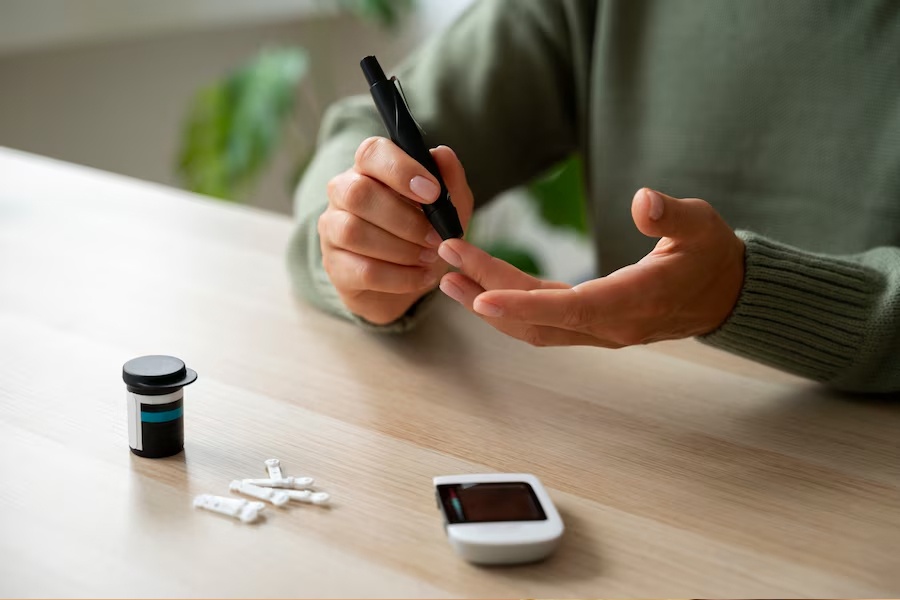
Diabetes is a chronic condition that occurs when the body suffers from high blood sugar levels. According to the World Health Organization (WHO), about 83 crore people worldwide have diabetes. More than 95% have type 2 diabetes, which occurs when the body doesn't use insulin properly, leading to high blood sugar levels. If left untreated, diabetes can progress to severe complications and cause serious damage to the heart, blood vessels, eyes, kidneys, and nerves. In the process, several symptoms can arise. Some of the most common ones include feeling thirsty, fatigue, and needing to urinate more frequently than usual. However, there are more unusual symptoms you need to watch out for. Read to know one such surprising sign of diabetes.
Table of Content:-
Also Read: What Does An Ideal Breakfast Look Like For Diabetics: Foods To Eat And Avoid
One Unusual Sign Of Diabetes To Watch Out For

A recent study published in Scientific Reports explored how glucose levels in the body influence voice characteristics. Using a Continuous Glucose Monitor (CGM), 505 participants recorded their voices up to six times daily for two weeks. The data suggested that a high frequency or a high-pitched voice could be linked to high blood sugar levels. Researchers noted that for every 1 mg/dL increase in glucose, the frequency of the participant's voice rose by 0.02 Hz. This means if your blood sugar went from a normal fasting level of 80 mg/dL to 180 mg/dL after a meal, your voice pitch might increase by about two Hz.
This pattern was consistent across non-diabetic, prediabetic, and type 2 diabetic individuals, suggesting that glucose levels may affect vocal vibrations.
In a media interaction, Jaycee Kaufman, lead author of the study and a scientist at Klick Labs, said: “By establishing a significant positive association between glucose levels and fundamental frequency, our study provides compelling justification for more research on using voice to predict and monitor glucose levels.
“Whereas current glucose monitoring methods are often invasive and inconvenient, voice-based glucose monitoring could be as easy as talking into a smartphone, which could change the game for the estimated 463 million people around the world living with type 2 diabetes.”
Speaking with the OnlyMyHealth team, Dr Bhumesh Tyagi, General Medicines, Sharda Hospital, Greater Noida (who was not a part of the study), said, "Because hyperglycemia (or high blood sugar) affects nerve activity, inflammation, and hydration, it can indirectly result in changes in voice, including pitch."
"Dehydration brought on by high blood sugar can also cause the vocal cords to become less lubricated, which limits their flexibility and may change the voice's pitch or tone," he added.
Furthermore, the nerves that control the larynx may be impacted by diabetes-related neuropathy, which is characterised by nerve degeneration, leading to problems with voice modulation. Vocal cord and throat oedema or discomfort brought on by chronic inflammation linked to elevated blood sugar levels can also contribute to voice changes.
Also Read: How Diabetes Can Affect Different Parts Of The Body
How To Know If High Pitched Voice Is Associated With Diabetes Or High Blood Sugar

A high-pitched voice or changes in voice do not necessarily indicate diabetes or high blood sugar. However, in some people, it can indicate elevated blood sugar levels.
According to Dr Tyagi, it is crucial to assess the medical history and related symptoms in order to ascertain whether a high-pitched voice is linked to diabetes or high blood sugar.
“High blood sugar or diabetes may be indicated by symptoms including excessive thirst, frequent urination, exhaustion, slow-healing wounds, or changes in voice,” he said, adding, “To confirm diabetes, diagnostic testing such as glucose tolerance tests, fasting blood sugar, and HbA1c (which measures average blood sugar levels over the previous three months) are crucial.”
To get a thorough knowledge of the underlying issue, speaking with a voice therapist or ENT specialist can also help rule out other reasons for voice changes, such as infections or problems with the vocal cords.
Early Detection Is Key For Improving Diabetes Management

To manage diabetes effectively, it is crucial to first diagnose it. Dr Tyagi emphasises the importance of early detection, saying that it greatly enhances diabetes control by enabling prompt intervention.
“Finding these modest indicators could lead to an earlier diagnosis and improved glucose control with medication, exercise, and dietary changes. The danger of consequences like neuropathy, which can irreversibly damage the nerves governing the larynx and other bodily systems, is decreased with early care,” he noted.
Additionally, assessing voice alterations as a possible early indicator aids medical professionals in determining inflammation and hydration levels, two factors that are crucial in the treatment of diabetes.
Also watch this video
How we keep this article up to date:
We work with experts and keep a close eye on the latest in health and wellness. Whenever there is a new research or helpful information, we update our articles with accurate and useful advice.
Current Version